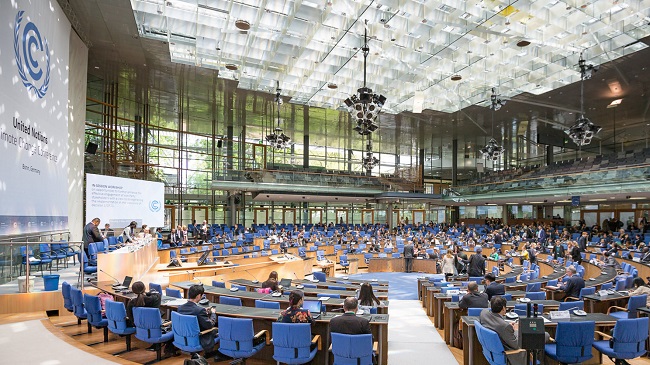As climate negotiators gather in Bonn for the second and last week of talks leading up to COP30 in Brazil in November 2025, more than 200 civil society and Indigenous Peoples groups have put forward bold reform proposals to make the UN Framework Convention on Climate Change (UNFCCC) more effective at tackling the climate crisis.

After more than 30 years of climate negotiations, the UNFCCC process appears to have consistently fallen short of achieving climate justice. In these three decades, global greenhouse gas emissions have steadily increased, intensifying the climate crisis and inflicting growing devastation on people and the planet, particularly in the Global South.
The United Call for an Urgent Reform of the UN Climate Talks presented on Monday, June 23, 2025, centres around five pillars, including one that urges the 198 UNFCCC Parties “to embrace the possibility of majority-based decision-making to break deadlocks when attempts at securing consensus have failed.”
The United Call also urges an end to the “trade show” that COPs have become, including through the establishment of an accountability framework to address conflicts of interest and curbing the undue influence of fossil fuel and other polluting industry lobbyists on the climate talks. In addition, the reform proposals aim to ensure inclusivity, increase transparency and accountability, and uphold human rights in the context of the climate negotiations.
The five pillars of the United Call for an Urgent Reform of the UN Climate Talks are:
- Restore Power and Equity
- End the Trade Show and Stop Corporate Capture
- Move Away from Accountability-Free Blackbox Negotiations
- Respect and Protect Human Rights
- Align and Strengthen International Climate Governance
United Call Endorsers
The set of proposals is endorsed by four major networks: Climate Action Network (CAN), the Global Campaign to Demand Climate Justice (DCJ), the Children and Youth Constituency (YOUNGO), the Women and Gender Constituency (WGC), and over 200 organisations, including the Centre for International Environmental Law, Corporate Accountability, Amnesty International, Oxfam, and Greenpeace.
Lien Vandamme, Senior Campaigner, Centre for International Environmental Law (CIEL), said: “For 30 years, the climate negotiations have systematically failed to deliver climate justice, undermined international law and allowed the fossil fuel industry to write the rules. The absence of agreed procedures for decision-making allows big polluting countries to hold the negotiations hostage. The lack of accountability gives a false sense of impunity. Yet, effective multilateralism is the only way out of the multiple global crises.
“This year is key, including with several international courts working on climate advisory opinions. The time is now for the UNFCCC to become the climate regime it should have been for the past decades: one centered around international obligation to prevent dangerous climate change and remedy related harm. All Parties must come together and radically choose fossil-free climate multilateralism rooted in justice.”
Camila Mikkie, Officer at social environmental programme at Conectas Direitos Humanos, said: “Brazil has placed itself at the centre of an important and necessary debate on reforming our climate regime at a pivotal moment of paradigm shift so that it can truly deliver on the implementation of the Paris Agreement and subsequent decisions, and ensuring justice for those most affected. The world now expects Brazil to lead the necessary changes.”
Rachitaa Gupta, Global Coordinator, Global Campaign to Demand Climate Justice (DCJ), said: “For 30 years, the UNFCCC has failed to catalyse meaningful climate action. Every single year. Inside the halls of the UNFCCC, it may seem as though it is just another year of business as usual, or as if there is no urgency. But outside these halls, this could not be further from the truth. At home, our communities are enduring incalculable loss and damage from the compounded impacts of the climate crisis.
“At home, emissions are reaching record highs year after year. At home, for many, the climate crisis is a fight for life and death. For the UNFCCC to become legitimate, it must fundamentally reimagine itself. It must reform. Anything short of this is continued complicity in the climate crisis.”
An Lambrechts, Biodiversity Politics Expert at Greenpeace International, said: “Thousands of people converge on climate COPs annually, hoping for decisions that will keep 1.5°C in sight, but that’s impossible if we don’t act to end nature destruction and fossil use at the same time. This means bridges with the CBD and other multilateral environmental agreements must be strengthened with urgency so that we can tackle the polycrisis the world is facing from all angles. This could then help ensure big polluters and nature destroyers who obstruct such decisions can be made to pay for the damage they’re inflicting instead of allowing them to block the changes we need.”
